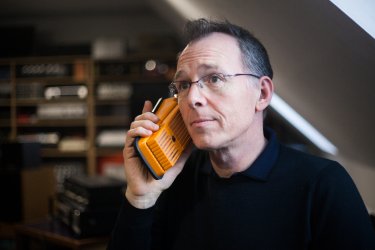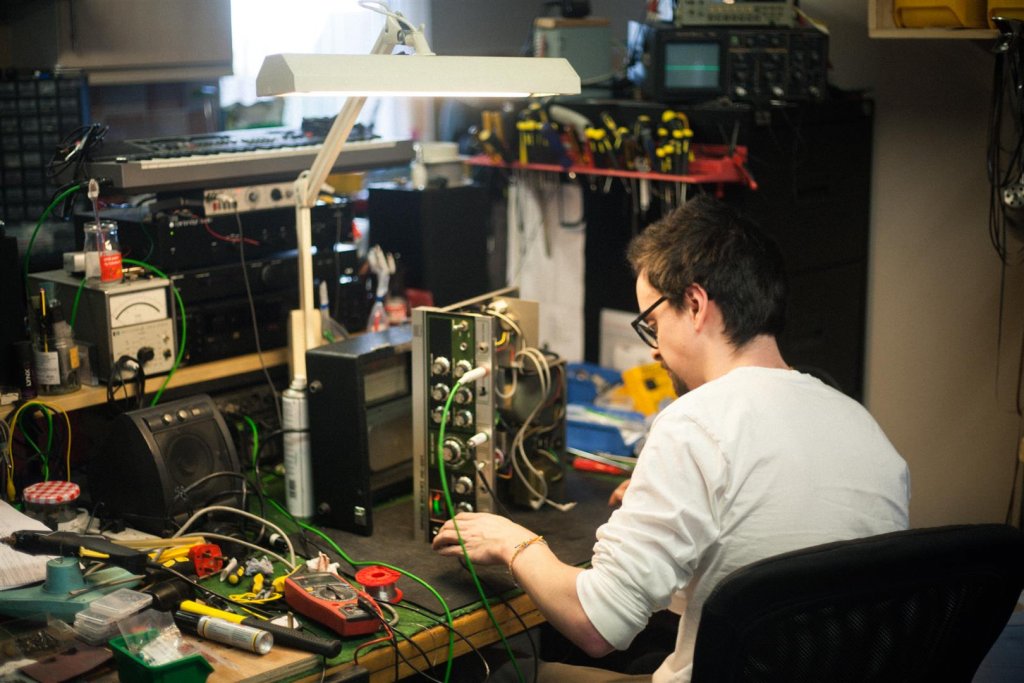Soundgas News
“Passion Don’t Lie” – The Quest For Techs Updated

WRITTEN BY: Tony Miln
UPLOADED: 11th Dec 2019

We finally have some availability in our service department and are taking on Roland echo service work. More about that here, but we thought it was also time to update our “Quest For Techs” series with details of why we believe this side of our work is so important, and what practical steps we are taking.

Regular readers will already know that here at Soundgas we are on a mission to train the techs of the future – this article follow on from The Quest For Techs Part One and Part Two (The True Cost of Vintage Gear). We believe it is the responsibility of those earning a living supplying vintage recording gear to their customers to invest in the future of that equipment. If this does not happen, then are dealers not simply profiteering at their customers’ expense?
If you purchase a rare expensive item for your studio, you not only anticipate it being operational for many years, but you can reasonably expect it to hold or increase in value over time (the latter is of course very much dependent on the former). However, if the only person who can service it is working alone, quite possibly in their sixties or seventies (and possibly located on another continent), then your new purchase’s future is less golden than it outwardly appears.
Obsolescence Obsession
This is part of what sets us apart from others who advertise GAS-inducing vintage synths and effects: we are committed to reinvesting for the future of your equipment. When Flood visited us a couple of years ago and remarked to me that he couldn’t find a good tech in London to fix his old synths and could we help, it was a lightbulb moment. I’d always assumed that successful producers, musicians and studios would have dedicated in house technicians to look after their gear.
This is how it used to be, but a couple or three decades into manufacturing electronics cheaply, built for obsolescence rather than repair, has left us with a skills shortage. I’ve written before about losing good valve amp techs over the years (who mostly trained as TV repairmen), but the rise of surface mount technology has resulted in a serious lack of experienced electronics repair techs of any type, never mind in the rarified world of studio gear and synths.
Seven Tech Army
So we set out to train more techs. When I last wrote about this, back in May 2018, our tech department was about to increase from one senior tech (Dr Huw), his understudy (Max), and one part-time synth tech (Chris) to include synth legend, James Walker. Since then, the tech department has grown to seven, three of whom are under 25.
Liam Gilmour joined us for a year’s tech training as part of his Birmingham Uni music degree course to study under James Walker. He has since returned to finish his degree and build a synth; he swiftly became a capable member of the team and we’re looking forward to welcoming him back next year (the videos and images above are all his handiwork).
Jez Caglayan joined us from Birmingham Uni in September to take up a similar position and is learning fast. Ben Hirst, who joined us as in-house studio engineer, quickly became a vital member of the tech team; his soldering baptism of fire involved finishing the Soundgas Studio patchbay only to have to immediately begin again when we brought in the Calrec. Ben has earned his brown coat, becoming Huw’s right-hand man and overseeing the building of the Soundgas Type 636.
Echo To The Max
It seems scarcely-credible that Max Dawson (that’s him in the photo at the start of this) has only been at Soundgas for only 2½ years. He came to us with a solid grounding in mechanics and electronics, courtesy of his dad’s auto garage, but the speed at which he has soaked up Huw’s training and knowledge is dizzying. From Space Echoes to Echoplexes to Binson Echorecs, Max has become proficient in all things echo (and many other repairs besides). He is now rebuilding Binson Echorecs to a standard unimaginable to me half a decade ago.
Swipe through the photos below to see Max’s first Binson:
Thirst For Knowledge
Indeed, it is the continual thirst for knowledge and improvement in our team that is vital. Anyone who claims to know all there is to know about vintage electronics is full of hot air, and such complacency has no place at Soundgas. We are all learning, all the time. We make mistakes, we learn from them, and we continually seek ways to improve. I’ve worked with a few experienced techs who’ve claimed to know these old machines inside out, but none have got close to matching the results that I hear coming from our tech department.
Laying Of Hands
There is no substitute for hands-on training: Dr Huw and James with their many decades’ experience can offer deeper insights into the equipment than most and both are excellent teachers, but theory only goes so far: without regular and varied practical experience, a trainee can only progress so far.
Nowhere in the world does a tech get the opportunity to see, hear, and then work on such a wide range of vintage gear as they do here at Soundgas; importantly they do so overseen by people who know just how good the results should be. We see and hear more Roland Space Echoes and Binson Echorecs than anywhere else on the planet, including pristine unused examples, so we know what to aim for when servicing and restoring these machines.
(And no, that isn’t a Space Echo below – it’s a rare stereo Hawk: effectively two echoes in one; it’s one of the more challenging machines to get right.)
A Soundgas trainee tech doesn’t see one Roland Space Echo every few weeks: it’s a continual stream; constant repetition is another reason our new techs progress so quickly. Our 18-year-old tech apprentice, Will, began a year ago as we all do, in the packing room – learning how to protect the gear in transit before being trusted to go any further.
After he learned how to clean it cosmetically, he started basic ‘top-servicing’ under close-supervision – cleaning tape transport components, switches, pots etc. Over the past year, he’s learned to perform much of the essential work to restore a Roland machine and has already seen more Space Echoes than most techs twice or three times his age.
The techs performing the service work are vital, but they are actually only half of the story: the extra essential ingredients being time and testing. Vintage equipment, once it’s been lovingly restored or serviced, then requires time for either (or both) soak and burn-in testing: not only to ensure that new components won’t fail, but also to reveal further faults that may have been masked by issues that have now been rectified. This is a vital part of the process, and nowhere more so than with tape and disc/drum echoes: electromechanical devices with moving parts have an uncanny ability to offer up further issues after servicing.
Eat Sleep Test Repeat
There is no rushing a thorough job. A period of extended testing is essential: without it, we are less assured of delivering a unit ready to run without issues for our customers. All tape echoes are soak tested for three days before they move to the next stage; for Binson Echorecs this period can be three months as we need to run, rest and repeat for some time to be assured of success.
Deep Listening
Once a machine has been serviced/restored and soak-tested, it passes to what we hope is the final stage of the process (but regularly is not): deep testing and listening. We have found it to be essential that this is not performed by the same person who has affected the repair. The restoration process can be emotional which can result in faults or issues being masked; there’s no substitute for a fresh and dispassionate set of ears.
Joel is the finicky man with the golden ears – and the scourge of the tech department. His perfectionism and attention to detail means there’s nowhere to hide and it is not uncommon for a machine to be returned for further tweaking after Joel has tested it. Depending on what the issue is, we may then need to run through the full cycle of soak-testing before Joel sees it again, hence we cannot both promise swift turnaround and to do the job right.
Joel also tests Binson Echorecs; his guitar playing is unforgiving of imperfections and issues, but the final say with these always rests with me. Nobody else here has heard as many machines as I have in the past thirty years: we need to know that a Soundgas Binson will live up to the name.
Love Can’t Turn Around
It is possible for someone to service and return a tape echo inside a day, but our process has evolved over the course of many years’ experience into what I have described above. When we sell an echo with a year’s warranty and ship it to another continent, we want to be very sure that we’ve done everything in our power to ensure its continued reliability, and our customers expect nothing less. I would sooner we sell and service fewer machines and do the job correctly: this is why our capacity for servicing remains very limited, in spite of our growing tech department.
The Long Game
Cutting corners is not the Soundgas way: I learned long ago that this is a false economy. Training new technicians is no short term win; it requires determination and commitment, and it comes at a high cost, but I believe it is vital and should be at the heart of what we do at Soundgas.
Up With The People
I’ve argued how essential this is for the future of the equipment, but it is really more about the people: about taking the pressure off the few capable individuals working ceaselessly to repair and maintain our gear. If we get them to share their knowledge, their workload can also be shared, and quality of life improved.
Share The Love
Not only is the knowledge protected by sharing, the people with priceless experience are too: a win-win situation. Being the only tech relied on by hundreds of people to maintain their precious vintage equipment brings with it a good deal of stress; this is compounded when household names’ signature sound relies heavily on its continued functionality.
Good Skills
Soundgas are committed to providing meaningful education, training and employment to the next generation: not only do we protect hard-won knowledge by sharing, but we are equipping our young techs with valuable life skills that ensure their future prosperity. To be a good tech you need a range of skills and you need experience: these we provide at Soundgas, but there’s something else that sets the best apart and only comes with the individual: passion.
Passion Don’t Lie
Passion sustains you through those jobs when you’re already days beyond billable time pinpointing one final niggling fault; it is what drives you to find new improved methods rather than merely accepting what’s been done before.
‘Passion don’t lie,’ said our much-missed friend Philippe Zdar, and passion is what burns brightly in us all at Soundgas. I am very fortunate to be surrounded by a team of passionate individuals committed to excellence, and I look forward to Soundgas technicians making a significant impact on the future of vintage gear.
======

